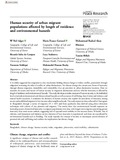| dc.contributor.author | Adger, W. Neil | |
| dc.contributor.author | de Campos, Ricardo Safra | |
| dc.contributor.author | Siddiqui, Tasneem | |
| dc.contributor.author | Gavonel, Maria Franco | |
| dc.contributor.author | Szaboova, Lucy | |
| dc.contributor.author | Rocky, Mahmudol Hassan | |
| dc.contributor.author | Bhuiyan, Mohammad Rashed Alam | |
| dc.contributor.author | Billah, Tamim | |
| dc.coverage.spatial | Bangladesh | en |
| dc.date.accessioned | 2021-04-14T14:59:13Z | |
| dc.date.available | 2021-04-14T14:59:13Z | |
| dc.date.issued | 2020-12 | |
| dc.identifier.citation | Adger W.N.; de Campos R.S.; Siddiqui T.; et al. Human Security of Urban Migrant Populations Affected by Length of Residence and Environmental Hazards, Journal of Peace Research 2021, Vol. 58(1) 50–66, doi:10.1177/000494410304700107 | en |
| dc.identifier.uri | https://opendocs.ids.ac.uk/opendocs/handle/20.500.12413/16540 | |
| dc.description.abstract | It is widely suggested that migration is a key mechanism linking climate change to violent conflict, particularly through
migration increasing the risks of conflict in urban destinations. Yet climate change also creates new forms of insecurity
through distress migration, immobility and vulnerability that are prevalent in urban destination locations. Here we
examine the extent and nature of human security in migration destinations and test whether insecurity is affected by
length of residence and environmental hazards. The study develops an index measure of human security at the individual
level to include environmental and climate-related hazards as well as sources of well-being, fear of crime and violence, and
mental health outcomes. It examines the elements of human security that explain the prevalence of insecurity among
recent and established migrants in low-income urban neighbourhoods. The study reports on data collected in Chattogram
in Bangladesh through a survey of migrants (N ¼ 447) and from qualitative data derived using photo elicitation
techniques with cohorts of city planners and migrants. The results show that environmental hazards represent an
increasing source of perceived insecurity to migrant populations over time, with longer-term migrants perceiving greater
insecurity than more recent arrivals, suggesting lack of upward social mobility in low-income slums. Ill-health, fear of
eviction, and harassment and violence are key elements of how insecurity is experienced, and these are exacerbated by
environmental hazards such as flooding. The study expands the concept of security to encompass central elements of
personal risk and well-being and outlines the implications for climate change. | en |
| dc.language.iso | en | en |
| dc.publisher | SAGE Publishing | en |
| dc.rights.uri | http://creativecommons.org/licenses/by/4.0/ | en |
| dc.subject | Climate Change | en |
| dc.title | Human Security of Urban Migrant Populations Affected by Length of Residence and Environmental Hazards | en |
| dc.type | Series paper (non-IDS) | en |
| dc.rights.holder | © The Author(s) 2020 | en |
| dc.identifier.externaluri | https://doi.org/10.1177/0022343320973717 | en |
| dc.identifier.ag | ES/R002371/1 | |
| dc.identifier.doi | 10.1177/0022343320973717 | |
| rioxxterms.funder | Default funder | en |
| rioxxterms.identifier.project | Default project | en |
| rioxxterms.version | NA | en |
| rioxxterms.funder.project | 9ce4e4dc-26e9-4d78-96e9-15e4dcac0642 | en |


